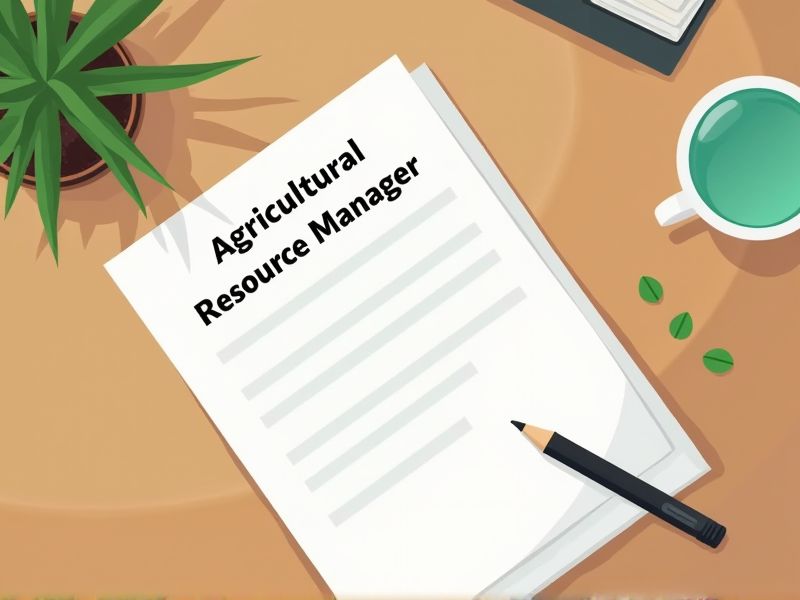
Agricultural Resource Managers oversee complex operations that involve the efficient use of resources, impacting productivity and sustainability. Certifications ensure they have the expertise in modern agricultural technologies, pest management, and sustainable practices critical for high standards. Regulatory compliance and risk management also demand a thorough understanding facilitated by relevant certifications. Here are essential certifications that an Agricultural Resource Manager might require.
Certified Crop Adviser (CCA)
Certified Crop Advisers provide expertise in nutrient management, which optimizes crop yields and reduces environmental impacts. Their knowledge of pest management helps minimize damage and chemical use, increasing ecological sustainability. They advise on soil health practices, contributing to long-term farm productivity and resource conservation. Implementing data-driven recommendations from CCAs leads to cost-effective resource allocation and improved farm profitability.
Certified Professional Agronomist (CPA)
Certified Professional Agronomists (CPAs) provide evidence-based expertise that enhances crop yield and quality, which is crucial for an Agricultural Resource Manager aiming to maximize resource efficiency. Their specialized training enables them to implement sustainable farming practices, aiding in the conservation of soil and water resources. CPAs possess a deep understanding of pest management and soil fertility, which helps prevent potential crop failures and reduces input costs. As agricultural policies and technologies constantly evolve, CPAs ensure the Agricultural Resource Manager stays compliant with regulations and adopts cutting-edge techniques.
Certified Soil Scientist (CSS)
Certified Soil Scientists (CSS) possess expert knowledge in soil characteristics, which directly influences crop productivity and sustainability. Agricultural Resource Managers rely on this expertise to optimize land use and improve agricultural outputs effectively. CSS professionals provide critical insights into soil management practices, ensuring compliance with environmental regulations. Their input helps in assessing and mitigating risks of soil degradation, thus safeguarding long-term agricultural viability.
Certified Irrigation Manager (CIM)
Proper irrigation management directly impacts crop yield and resource conservation. Certified Irrigation Managers possess specialized knowledge that helps optimize water usage, reducing waste and improving efficiency. They can implement advanced technologies and methods, leading to sustainable agricultural practices. Their expertise ensures compliance with environmental regulations, safeguarding both crops and the surrounding ecosystem.
Pesticide Applicator Certification (PAC)
Pesticide Applicator Certification (PAC) is needed for an Agricultural Resource Manager because it ensures they have the knowledge to use pesticides safely and effectively, reducing the risk of harm to the environment. Certification helps in compliance with legal and regulatory requirements, which protect both human health and the ecosystem. With PAC, managers are better equipped to make informed decisions about pest management, leading to more efficient agricultural practices. Certification signifies competence and can enhance the credibility and trust in the manager's ability to handle agricultural resources responsibly.
Certified Sustainable Agriculture Professional (CSAP)
The need for a Certified Sustainable Agriculture Professional (CSAP) arises from the increasing demand for sustainable practices that maximize productivity while minimizing environmental impact. As agricultural resource managers integrate sustainable practices, they face challenges that require specialized knowledge, which CSAP certification provides. The certification ensures managers are equipped with the latest techniques and research to address issues like soil health, water management, and biodiversity conservation. This certification also fosters trust among stakeholders by demonstrating a commitment to responsible and sustainable resource management practices.
Certified Environmental Professional (CEP)
The role of a Certified Environmental Professional (CEP) is critical for an Agricultural Resource Manager to ensure compliance with environmental regulations and sustainable practices. By integrating environmental expertise, a CEP aids in minimizing ecological impacts and optimizing resource use. Implementation of best environmental practices leads to enhanced productivity and reduced ecological risks. Their involvement ensures the agricultural operations align with both legal standards and market demands for sustainability.
Conservation Planning Certification (CPC)
The need for a Conservation Planning Certification (CPC) among Agricultural Resource Managers stems from the increasing necessity to adhere to sustainable practices that protect soil and water resources. Certification ensures that managers are proficient in applying scientifically backed conservation techniques, which can lead to improved crop yields and healthier ecosystems. Regulatory compliance demands that managers effectively implement conservation practices, and CPC provides the credentials to meet these standards. As consumer awareness and demand for environmentally responsible farming rise, certification helps managers demonstrate their commitment to sustainability, thereby enhancing their professional credibility and market competitiveness.
Farm Management Professional Certification (FMPC)
Farm Management Professional Certification (FMPC) equips Agricultural Resource Managers with validated skills, enhancing their decision-making capabilities. Certification ensures they stay updated with current agricultural practices and technologies, directly impacting farm productivity. Holding FMPC can improve trust and credibility with stakeholders, leading to more robust business relationships. Trained managers often exhibit increased efficiency and resource optimization, contributing to sustainable farm operations.
Agricultural Business Management Certification (ABMC)
Agricultural Resource Managers require an Agricultural Business Management Certification because it provides essential knowledge on modern agricultural practices and financial acumen. This certification enhances their ability to optimize resource allocation, increasing farm productivity. Understanding market trends is crucial, and ABMC helps managers make informed decisions that affect supply chain efficiency. Certified managers are more adept at navigating regulatory frameworks, ensuring compliance and sustainable practices in agriculture.
Summary
When you, as an Agricultural Resource Manager, earn certifications, your expertise becomes more credible, leading to increased job opportunities. This credibility often results in higher earning potential due to specialized skills. Certification can enhance problem-solving abilities, thus improving farm productivity. Consequently, your professional network expands, connecting you to more industry resources.
